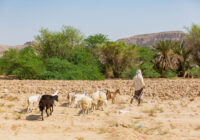Parliamentary elections in Iraq were originally scheduled for last spring, but the vote was postponed until October 10. This election is important for Iraqis in light of recent developments. For the past two years, Iraq has witnessed ongoing peaceful protests that have been countered with brutal state repression. The revolution is in a continuum, and Iraqis are prepared to cast their votes in the hope of bringing change.
Algeria to France: No Thanks for the Memories
Yet within the current situation, an important question arises: How much change can happen with newly elected parliament members when interrelated issues such as governmental corruption, Iranian influence in Iraqi affairs and the presence of armed militias seem less likely to change?
Religion and Politics
To understand what is taking place in Iraq, it is necessary to look back at recent developments. After the dramatic upheaval with the war in 2003, Iraqis witnessed the rise of religious authorities engaging in political activities, which is when the so-called theologico-political agenda began to develop. In political theories, scholar Leo Strauss introduced the “theologico-political problem” as an issue of authority — that is, political authority founded on religious revelations. This theory can explain age-old problems and help analyze the dynamics and parameters of political authority in the context of Iraq.
One significant issue that exists in Iraqi politics is the dominance of the Shia religious agenda in shaping the country’s affairs. Figures such as Muqtada al-Sadr, Ammar al-Hakim, Qais Alkhazaali and others are in charge. In fact, it is difficult to imagine or predict a change where Sunni or other secular political leaders arise, even within a climate of supervised fair elections.
This “theocratic” model has caused multiple predicaments that have worsened and complicated the existing conditions. It has simply proved dangerous. Such theologico-politicians who claim religious authority can be morally corrupt and disguised in a righteous mask. Yet such figures need to show they follow custom-interpreted religious doctrine. Their goal is to gain popular votes by convincing like-minded Iraqis of the importance of religion.
The consequences have intensified over the years. Theologico-political figures have established their own political parties and armed militias. The presence of militias in Iraq has become one of the most difficult issues to solve, particularly as militants operate autonomously with impunity. They have infiltrated government institutions where they have influence. They also maintain power and funding. Both of these issues make it difficult to dissolve such organized groups.
There has recently been an increase in assassinations, threats and targeting of “new” potential candidates, activists and proponents of change. In 2019, it was reported that a 700-name list was issued by the Iran-backed Shia militia Asa’ib Ahl al-Haq (AAH) to target Iraqi journalists and activists, including those living overseas, who support the ongoing protests.
Iraqis Are Tired
The core problem of this theologico-politics is that its rhetoric is always divisive. In a religiously diverse country like Iraq, people of different faiths and sects should coexist and be considered in the decision-making process. This one-sect politics can never function when its agenda inherently dismisses, discriminates against and persecutes the “other” group.
But Iraqis are tired of this. The majority of Shia-led protests oppose the government’s agenda and Iran’s interference in Iraq. The people do not want sectarian ruling anymore. The status quo favors Iran over Iraq’s interests to ensure long-term existence. Protesters have demanded basic infrastructure services and reform of issues exacerbated by Iranian meddling and accompanying governmental failures in all spheres. This includes a failing economy, widespread corruption, deteriorating health care and education systems and, most significantly, rising civil unrest.
In contrast to this new form of dictatorship — theologico-politics — what Iraq needs are conditions that support true liberal democracy, secularity and the separation of religion and state. However, this may seem implausible, especially when speculation over the election results seems more inclined toward the domination of Islamist politics.
The views expressed in this article are the author’s own and do not necessarily reflect Fair Observer’s editorial policy.
Support Fair Observer
We rely on your support for our independence, diversity and quality.
For more than 10 years, Fair Observer has been free, fair and independent. No billionaire owns us, no advertisers control us. We are a reader-supported nonprofit. Unlike many other publications, we keep our content free for readers regardless of where they live or whether they can afford to pay. We have no paywalls and no ads.
In the post-truth era of fake news, echo chambers and filter bubbles, we publish a plurality of perspectives from around the world. Anyone can publish with us, but everyone goes through a rigorous editorial process. So, you get fact-checked, well-reasoned content instead of noise.
We publish 2,500+ voices from 90+ countries. We also conduct education and training programs
on subjects ranging from digital media and journalism to writing and critical thinking. This
doesn’t come cheap. Servers, editors, trainers and web developers cost
money.
Please consider supporting us on a regular basis as a recurring donor or a
sustaining member.
Will you support FO’s journalism?
We rely on your support for our independence, diversity and quality.






